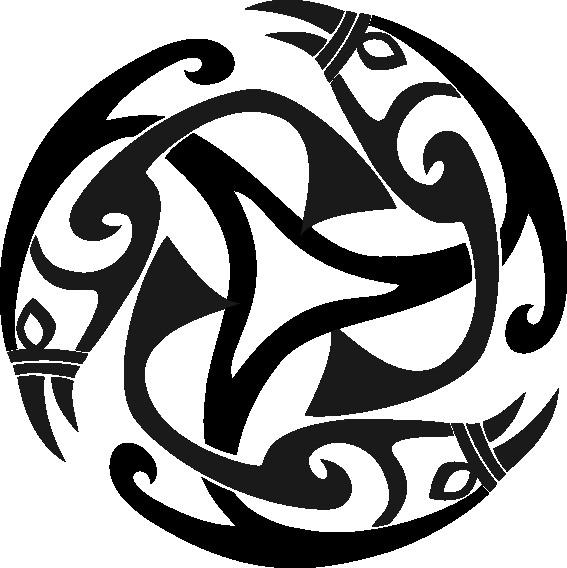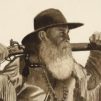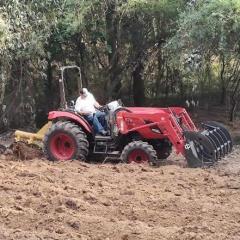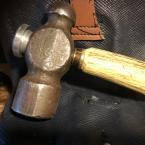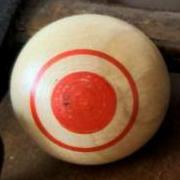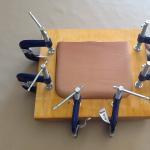-
Posts
1,091 -
Joined
-
Last visited
About DJole
- Birthday 02/13/1965
Contact Methods
-
Website URL
http://
Profile Information
-
Gender
Male
-
Location
Tacoma, WA
-
Interests
Fiddles, books, big trees, leather, swords, and keeping the house intact.
LW Info
-
Leatherwork Specialty
Dark Age and Medieval European inspired designs, pouches and boxes
-
Interested in learning about
shoe-making, tooling, hand stitching
-
How did you find leatherworker.net?
GoogleFu
Recent Profile Visitors
18,997 profile views
DJole's Achievements

Leatherworker.net Regular (4/4)
-
One of the biggest temptations is to jump right in and start making more complicated pieces, before we have the knowledge and experience. It's a very common thing for beginner leatherworkers -- most of us have done it! One thing that will help you learn is good leather, especially if you want to learn tooling. Cheap leather will be frustrating, but you don't want to spend a lot of money on beautiful expensive leather yet (until you know what you are doing). So there should be a mid-range that will let you buy leather that you won't mind throwing away on practice pieces. Is there a leather supply store near you?
-
I have only beveled the flesh side on very thick (think armor thick) pieces, which are one piece of leather. Two pieces of leather, sewn together, are sewn flesh to flesh, so only the grain side needs bevelling.
-
You might want to look at Kevin Lee's stitching irons. Among the sets which are comparable in price to what you note above, he also has inexpensive sets which will help you decide what you like (diamond vs pricking, and so on): https://www.kevinleetools.com/products/basic-diamond-chisel For example, he offers a 1+2+4+6 prong set for 30 dollars. I bought his reverse iron set in 3 mm, to work with my 3mm Japan Goods diamond set. I have used them enough to recommend them as a good starter set for somebody who doesn't want to invest a lot before figuring out if diamond chisels are what they want. They are well-polished right out of the box, which is very helpful. They are light and small, which works for my hands, but big handed folk might find them uncomfortable.
-
Okay, that certainly helps narrow down what you need! You don't have watch straps on there, for example, which use much smaller irons and thread. So, it looks like maybe 4 to 5 mm would match the leather thicknesses required for those items, for strength and visual proportions. It's unclear if you're going for a set of pricking irons (which merely mark the holes with a slit, which are completed by a stitching awl), or a set of Japanese style diamond chisels (which go through both layers, making a narrow diamond hole that usually doesn't require an awl). You also need to make sure to match your needles and thread to the hole size and spacing. Here's a quick chart that I cribbed from somewhere else, which helps me match them up: John James Needles Threads Size Size Length (mm) diameter (mm) Tiger/Ritza (mm) Lin Cable 4 004 48 0.4 0.6 532/632/832 2 002 54 1 0.8 432/332 0 1/0 57 1.1 1 00 2/0 57 1.3 1.2 000 3/0 62 1.6 Most of what I do falls in the middle range -- for my 3mm diamond irons, I use the 1/0 needles, with either .8 or 1 mm thread. For thicker projects, the 5 mm irons are what I pull out, with correspondingly larger needles and thread.
-
I wanna go to your school! But really, that's a very clean and crisp bag. Nice work!
-
I got my reverse irons here: https://www.kevinleetools.com/products/basic-diamond-chisel They are the Japanese diamond chisel (not the French pricking iron/slit style). size: 3.0, 4.0,5.0, or 6.0mm tooth numbers: *1+2+4+6 set *10 *15 *20 *1+2+4+6 reverse set That bottom set is what I have. I use them as a companion to a Japan Goods regular direction set (3mm, 1,2,3,4,6 and 10 tooth). Even though they are a different make, they match up just fine on the leather. These irons are light, and I think they might be small in size for folks with large hands, but they are well-polished and ready to use. ---------------------------- In case you need a French style reverse, Kevin Lee also features those to match his regular irons: https://www.kevinleetools.com/products/kl-french-style-pricking-iron Size 1.93mm, 2.25mm, 2.45mm, 2.7mm, 3.0mm, 3.38mm, 3.85mm, 4.0mm, 4.5mm, 5.0mm Tooth 1, 2, 8, 20, 2+8 tooth reverse, 12, 5, 10 --------------------------------- Kevin Lee has reverse sets for other sets of his irons, both the low budget set (which I have) and a couple of the more expensive sets. I don't work for Kevin Lee, nor do I get any benefits from his company, but I am a satisfied customer who invested in his tools.
-
I have one set of Japanese style 3mm irons with a matching set of 3mm REVERSE irons, in which the slots are angled the other way. (/ / / and \ \ \, to roughly illustrate.) I have found the following steps useful, especially on thicker pieces: 1) Before putting the 2 pieces (or edges) together, use dividers to get a nice straight line, and use the irons to punch one side of the piece, not both. I'll call that the front side. Be sure that the irons are VERTICAL, so the holes go straight without any wobbling. I find that I am much more consistent with the irons running along the line away or towards me (rather than across), since I can just see the vertical better. 2) Tape/glue the front and back sides together. 3) Use the pre-punched front side as a GUIDE, and re-punch every 5th or 10th hole with a single prong, or a diamond awl, going all the way through the pre-punched front layer just enough to show on the reverse side. 4) Use dividers on the reverse side to mark a stitching line equal to the front side margin. That line should consistently cross the guide holes. 5) Use the reverse irons, and the guide holes, to create the stitching line on the back side. The reverse irons should match the pre-punched front side holes, since they are a same spacing. 6) Now I am ready to stitch, using the advice given above about consistency in needle technique.
-
That device doesn't burnish the edges, it merely trims them. I don't think it's quite what the original poster was looking for.
-
It looks pretty good-- the blue thread is a nice color choice that pops out. Remember that if you use colored thread that contrasts, you have to be extra careful with your stitching because every flaw will pop out too! From the picture of the outside, looking at the stitching line, there are some slightly crooked spots. Comparing those to the inside, the inside lines are nice and straight and even. It is likely that you are still working to keep the stitching iron perfectly vertical when you strike it with the mallet. Go slowly, take your time and double-check the iron alignment before striking. After a while, you'll get it. This is normal -- everybody who does hand stitching has to learn this! ;-)
-
It really makes a difference to match the thread and needle and hole size. I found this diagram somewhere, copied it down, and let me put it here, too John James Needle size Length Outside diameter Ritza “Tiger” thread LIN Cable 4 004 48 mm .9mm 0.6 532/632/832 2 002 54 1 0.8 432/332 0 1/0 57 1.1 1 00 2/0 57 1.3 1.2 000 3/0 62 1.6 What is the table telling me? If I am using 3mm stitching irons on my thinner leather project, the best results are using a 004 needle, with the corresponding thread. If I am using a thicker thread (like those Maine threads), then try a 1/0 or 2/0 needle, with a larger stitching iron (5mm works well, 4 maybe) I used to have that similar problem until I figured it out. So you should get a few packages of needles (they're not expensive, after all) to match your thread sizes, and using a stitching iron to match. I have a set of 3mm and 5 mm diamond (Japanese style) stitching chisels, which are my go-to sizes. I have a set of 4mm stitching irons (French or slit style), too. I have a few remaining Tandy "Big Eye" needles, which I keep around for nostalgia. ;-)
-
I have been enjoying watching various of these YouTube videos produced in Germany. They cover an astounding breadth of handwork -- making bagpipes, alpenhorns, French horns, bread, cheese, ham... the list goes on and on! But this forum is for leatherworkers, and there are some videos featuring leather workers. The audio is in German, but subtitles are available in both German and English. I hope you find these enjoyable and perhaps useful! How to make a leather belt | SWR Craftsmanship: < How to make a purse | SWR Craftsmanship: < How to make a leather satchel | SWR Craftsmanship: < How to tailor leather pants | SWR Handwerkskunst: <
-
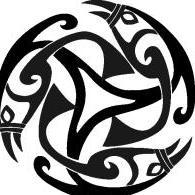
Shopping cart security tokens
DJole replied to Klara's topic in Purses, Wallets, Belts and Miscellaneous Pocket Items
And to add to the confusion, the industry term for them is a "Baskart".... ;-) -
I got an arbour press last year. (Vevor #1, a one ton press.) I made sure to get one with the hole and set screw already drilled in the square pressing shaft. I use it to set rivets, snaps, and for my custom maker's stamp. It is a lot more accurate than hammering! I don't have any clicker dies for use on it yet, but I'd like to try that next. I have been pleased with it so far.
-

Just wondering. Why such thick, heavy belts?
DJole replied to SUP's topic in Leatherwork Conversation
Maybe you could lose that Chapstick and save a couple pounds? haha! Seriously though--that's a 20 year old belt? It's a tough piece of work!


